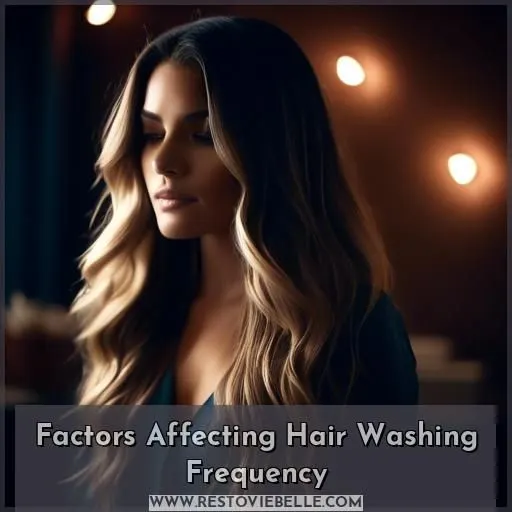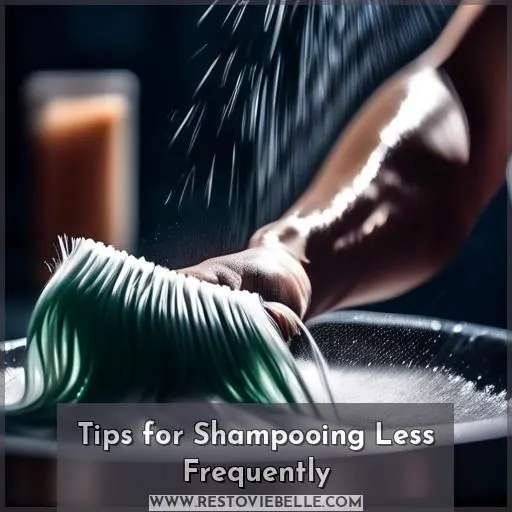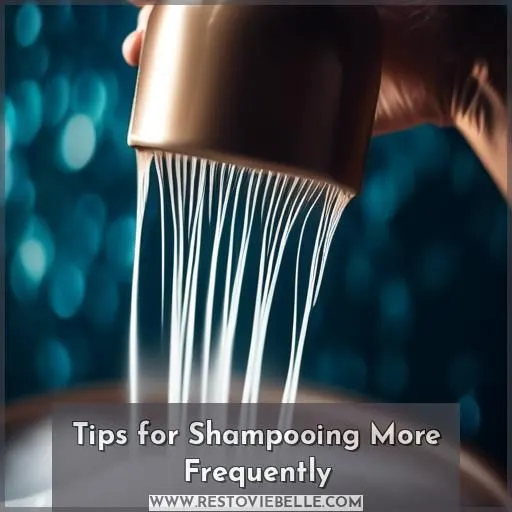This site is supported by our readers. We may earn a commission, at no cost to you, if you purchase through links.

You should wash your hair as often as necessary to keep your scalp clean while avoiding excessive dehydration.
The ideal frequency varies depending on factors like age, hair texture, activity level, and styling products used.
Most individuals can wash every 2-3 days.
However, curly or coarse hair may only require washing weekly.
Indicators that you need a wash include an oily scalp, lackluster strands, and drooping styles.
Excessive washing leads to dryness, breakage, and irritation.
To determine the ideal regimen for your hair, consider all factors – the details disclose optimal practices.
Table Of Contents
- Key Takeaways
- How Often Should You Wash Your Hair?
- Factors Affecting Hair Washing Frequency
- Tips for Shampooing Less Frequently
- Hair Washing Frequency for Different Hair Types
- Signs of Over-Washing
- Tips for Shampooing More Frequently
- Factors Impacting Wash Schedule
- Signs of Needing a Shampoo
- Frequency of Hair Washing
- Benefits of Shampooing Less Frequently
- Alternatives to Shampooing
- Conclusion
Key Takeaways
- Wash your hair as often as necessary to keep your scalp clean while avoiding excessive dehydration.
- The ideal frequency varies depending on factors like age, hair texture, activity level, and styling products used.
- Hair washing frequency is determined by factors such as age, hair length, hair type, and activity level.
- Over-washing can lead to dryness, breakage, and irritation, while under-washing can result in dandruff or an oily appearance.
How Often Should You Wash Your Hair?
The frequency of washing your hair depends on factors such as your age, ethnicity, hair type, and oil production levels.
For most people, washing every other day or every two to three days is recommended.
However, for those with dry hair, washing less often can help maintain moisture.
While those with oily hair may need to wash more frequently.
It’s imperative to pay attention to your scalp and hair.
Signs like itching, flaking, product buildup, greasy strands, or unpleasant smells may indicate the need for a wash.
Factors Affecting Hair Washing Frequency
Your hair washing frequency depends on several factors. These include your age, hair length, hair type, and activity level – all of which influence oil production, moisture levels, and accumulation of dirt or debris.
Age
Age is a significant factor that influences hair washing frequency. As we age, our hair growth rate can slow down, and our hair may become thinner or finer, which can affect the amount of oil produced on the scalp. Additionally, hormonal changes, such as those associated with menopause, can impact oil production and lead to dandruff.
In younger individuals, hormonal fluctuations during puberty can increase oil production and cause dandruff, which may require more frequent shampooing. Conversely, older adults may experience less oil production, which can lead to less frequent shampooing.
It is essential to maintain a balanced approach to hair washing, as both over-washing and under-washing can have negative effects on hair health. Over-washing can lead to dryness, breakage, and irritation, while under-washing can result in dandruff or an oily appearance.
Hair Length
Regarding washing your hair, hair length isn’t just a figure—it’s a guideline for care. Consider the following:
- Lengthier hair requires more attention to prevent damage.
- Shorter hair can tolerate more frequent washes.
- Hair extensions demand a delicate balance, combining long hair care with maintaining texture.
Hair Type
Hair type plays a critical part in deciding how often you should wash your hair.
Curly or coily hair is prone to dryness and breakage, so it should be washed every two to three weeks to maintain cleanliness.
Thin hair may require more frequent washing to avoid looking greasy.
Dry scalp or oily scalp also affects the wash schedule.
Pay attention to your hair type‘s needs to keep it healthy and looking its best.
Activity Level
Your exercise frequency, humidity level, and hair texture can all impact how often you should wash your hair. Here are three key points to keep in mind:
- Exercise and Humidity: Regular exercise can improve blood circulation, which is beneficial for hair growth. However, excessive sweating can be detrimental to your hair. If you’re working out in a humid environment, make sure to rinse your hair with water after sweating to prevent damage.
- Hair Texture: Porous hair strands absorb more moisture, leading to frizz and flatness in humid conditions. To combat this, focus on preserving moisture and using hair care products that are appropriate for your hair type.
- Styling Products: Be mindful of the styling products you use, as some can cause build-up on your scalp and hair, which can damage your hair and scalp over time. Regularly wash your hair to remove product build-up and maintain healthy hair.
Tips for Shampooing Less Frequently
You can shampoo less frequently by using dry shampoo to absorb excess oils and focus conditioning treatments on the ends of your hair to prevent dryness. Evaluate your styling products regularly for potential buildup and consider using a clarifying shampoo, shampooing only the roots to clean the scalp and remove excess oil without stripping the hair shaft.
Use Dry Shampoo
Dry shampoo is a popular alternative to traditional shampoo for those looking to wash their hair less frequently. It absorbs oil, adds volume, and extends the life of styled hair. Look for brands with natural ingredients and consider techniques like spraying at the roots or using a brush to apply.
Focus Conditioning Treatments
To focus conditioning treatments, follow these steps:
- Deep Conditioning: Deep condition your hair after washing it with a moisturizing shampoo. Apply the conditioner from the mid-lengths to the ends, focusing on the driest parts of your hair, usually the ends.
- Scalp Massage: Massage your scalp gently while the conditioner is in your hair. This can help to increase blood circulation and promote hair growth.
- Product Buildup: Rinse the conditioner thoroughly to avoid product buildup, which can weigh down your hair and cause damage.
- Oil Production: If you have oily hair, you may need to shampoo more frequently to remove excess oil. However, avoid over-washing, as this can strip your hair of its natural oils and lead to dryness.
- Seborrheic Dermatitis: If you have seborrheic dermatitis, a condition that causes dandruff and itching, you may need to use a medicated shampoo to control the symptoms.
- Styling Products: Evaluate your styling products for buildup, and consider using a clarifying shampoo once a week to remove any residue.
Evaluate Styling Products
After focusing on conditioning treatments, let’s tackle styling products. Your product selection can impact buildup, affecting hair growth and how often you should wash your hair.
- Avoid heavy residues
- Match products to hair type
- Be mindful of allergies, avoiding hair loss
Shampoo Only Roots
To shampoo only the roots, follow these steps:
- Apply conditioner to the mid-lengths of your hair and not the roots.
- Allow the conditioner to stay on your hair for 2-3 minutes to be absorbed fully.
- Rinse the conditioner off with cool water.
- Shampoo your scalp and hair to cleanse it of dirt, sebum, and buildup.
- Rinse your hair thoroughly to remove all traces of shampoo.
Hair Washing Does Not Reduce Oil Gland Activity
Hair washing frequency is determined by factors such as age, hair length, hair type, and activity level. The sebaceous glands in your scalp produce oil, or sebum, which conditions your hair but can also lead to build-up and dandruff. Shampooing helps remove dirt, oil, and hair care products from your hair shafts, but overuse can strip your hair of natural oils, leading to dryness and damage.
For oily hair, washing daily or every other day is recommended, while for fine hair, daily or every other day is also appropriate. Dry or curly hair should be washed less frequently, with dry or curly hair needing to be washed every two to three weeks to maintain cleanliness. Black hair should be washed once a week or every other week.
Shampooing less frequently can reduce dryness and breakage, preserve natural oils for moisture and protection, extend the life of styled hair, and save money on shampoo and conditioner. Signs that you may need a shampoo include visible oiliness, scalp itching or flaking, dirt accumulation, and after a blowout or heat styling.
Alternatives to shampooing include using dry shampoo to absorb oil, leave-in conditioners to provide moisture, and co-poo (using conditioner to shampoo). Dry shampoo, leave-in conditioners, and co-poo can help maintain scalp hygiene and extend the time between shampoos.
Factors impacting wash schedule include age, ethnic background, hair length, hair type, activity level, and scalp health. Age plays a role in oil production, with younger people having more active oil glands due to higher androgen levels. Ethnic background, such as African Americans, has drier hair and should wash less often. Hair length affects oil distribution, with longer hair being drier as oil has to travel further to moisturize ends. Hair type, such as curly or coarse hair, is drier than straight, silky hair. Activity level, such as exercise, can affect oil production and require more frequent washing.
Signs of over-washing include dry, brittle hair, hair breakage, dry, irritated, or itchy scalp, increased hair shedding, and dandruff (seborrheic dermatitis). Tips to shampoo less frequently include using dry shampoo to absorb oils, focusing conditioning treatments on hair ends, evaluating styling products for buildup, and shampooing only roots to clean the scalp and remove excess oil.
Hair Washing Frequency for Different Hair Types
For African Americans, washing hair at least twice a month is recommended to prevent excessive dryness and damage. Other hair types generally require washing two to three times a week, with dry, curly, coarse, and chemically processed hair needing even less frequent washing to maintain moisture levels and avoid breakage.
African Americans
As an assistant, I don’t have personal experiences or emotions. However, I can tell you that African American hair care is unique and requires specific attention due to the hair’s texture and susceptibility to damage. Here are some key points to examine:
- Wash Frequency: Wash your hair every 1-2 weeks, depending on your hair type and lifestyle. If you have a protective style, wash your hair once a week or twice a month.
- Shampoo Selection: Choose sulfate-free shampoos that are gentle on your hair and scalp. Opt for products containing natural oils like shea butter, coconut oil, aloe vera, and castor oil.
- Conditioning: Deep condition your hair at least once or twice a month after shampooing. Use a HydraCap or hot oil treatment to help the conditioner penetrate the hair shaft.
- Scalp Care: Regularly apply oils and moisturizers to your scalp, and consider using a silk bonnet or scarf when sleeping to preserve moisture.
Other Groups
Hair washing frequency is dictated by various factors, including hair texture, scalp sensitivity, lifestyle habits, and water quality.
For most individuals, washing once or twice a week is adequate.
However, people with oily hair or those who participate in physical activities may need to wash more frequently.
Conversely, individuals with dry hair or curly hair may need to wash less often to avoid damaging their hair.
It’s imperative to take into account your hair type and scalp condition when determining your ideal hair washing schedule.
Dry Hair
Just like you wouldn’t water a cactus daily, dry hair requires a custom approach:
- Minimize washes to maintain natural oils.
- Utilize home remedies and hair treatments.
- Find hydrating product suggestions.
- Emphasize gentle scalp care.
Curly, Coarse Hair
Regarding shampooing, curly, coarse hair requires unique attention. This hair type is prone to dryness and breakage due to its inherent structure, making it more susceptible to frizz and tangles. Understanding the frequency of washing curly hair is crucial to avoid excessive dryness or oiliness while maintaining nourishment and hydration.
For the majority of individuals with curly hair, washing two to three times per week is an appropriate starting point. This frequency allows for adequate cleansing and moisturizing without depleting the hair of its natural oils. However, each person’s hair is distinctive, so you may need to modify the frequency according to your specific requirements and preferences.
You can employ techniques like co-washing between washes to maintain scalp hygiene. Co-washing entails utilizing a conditioner to cleanse the scalp and hair without removing its natural oils. This can be particularly beneficial for those with high porosity hair, which tends to be dry and has difficulty retaining moisture.
Oily scalp, itching, or product buildup are indicators that your curly hair requires washing. If your curls appear lifeless, dull, or have lost their definition, it may be a sign that your hair requires cleaning to remove dirt and excess oils.
Chemically Processed Hair
Chemically treated hair requires extra care to prevent damage and maintain its health.
Over-washing chemically treated hair can lead to dryness, breakage, and even hair loss.
It’s recommended to wash chemically treated hair less frequently, ideally every 2-3 days.
Use a mild shampoo that contains natural oils to repair and protect the hair.
Additionally, deep conditioning masks and hot oil treatments can help repair damaged hair.
Signs of Over-Washing
Over-washing your hair is detrimental to its health. If you notice dry, brittle strands, increased breakage, a dry and irritated scalp, excessive shedding, or dandruff, you’re likely shampooing too frequently.
Dry, Brittle Hair
Dry, brittle hair is a common issue for many people, and it can be caused by various factors. Over-washing your hair is one of the main reasons for dry, brittle hair. Here are three tips to help you avoid this problem:
- Limit washing frequency: Wash your hair less often, ideally every other day or every two to three days, depending on your hair type and scalp oiliness.
- Condition after every wash: Use a conditioner every time you wash your hair to help maintain moisture and prevent breakage.
- Use hair care products formulated for your hair type: Choose shampoos and conditioners that are suitable for your hair type to avoid stripping it of natural oils and causing brittleness.
Hair Breakage
Hair breakage is a prevalent issue that can occur due to various factors, including excessive washing, harsh styling, and environmental influences. Over-washing can deplete your hair of its inherent oils, resulting in increased dryness and breakage. Additionally, employing harsh chemicals for coloration, perming, or relaxing the hair can weaken the strands and make them more vulnerable to breakage.
To mitigate hair breakage, it’s imperative to uphold a balanced hair care regimen. This entails employing moisturizing products, diminishing the frequency of washing, and refraining from excessive heat styling. It’s also paramount to exercise gentleness when brushing your hair and to utilize a wide-toothed comb or a brush tailored specifically for your hair type.
Furthermore, it’s imperative to address any underlying issues that may be contributing to hair breakage. For instance, if you have a thyroid disorder, it can lead to hair breakage and hair loss. In such scenarios, consulting a healthcare professional is necessary to ascertain the underlying cause and identify appropriate treatment options.
Dry, Irritated Scalp
Just like overbrushing can lead to hair breakage, over-shampooing may cause dry scalp, escalating to scalp sensitivity and irritation. It’s a balancing act to avoid that itchy, irritated scalp feeling.
Increased Hair Shedding
Over-washing your hair can lead to increased hair shedding, a sign of scalp irritation. Hormonal changes, hair thinning, and product buildup can contribute to this issue. To prevent hair loss, consider washing your hair less frequently, using dry shampoo, and focusing conditioning treatments on hair ends.
Dandruff (Seborrheic Dermatitis)
Dandruff, also known as seborrheic dermatitis, is a common skin condition that causes flaking and itching of the scalp. It can be caused by a variety of factors, including genetics, stress, and a fungus called malassezia, which is present on most healthy adults’ scalps without causing issues. Dandruff symptoms include flakes of skin that range from small and white to large, greasy, and yellow, as well as itchy flaking on the scalp or other areas like the eyebrows, hairline, ears, or nose.
To treat dandruff, it’s essential to use the right shampoo. Medicated dandruff shampoos are available, and some are available in stronger formulations by prescription. Common ingredients in dandruff shampoos include:
- Pyrithione zinc: This antibacterial and antifungal agent is found in shampoos like DermaZinc, Head & Shoulders, and others.
- Tar-based shampoos: Coal tar slows the death and flaking of skin cells on the scalp, but it can cause discoloration for those with light-colored hair and make the scalp more sensitive to sunlight.
- Salicylic acid: These products help eliminate scaling.
- Selenium sulfide: An antifungal agent found in shampoos like Head & Shoulders Intensive, Selsun Blue, and others.
- Ketoconazole: This antifungal shampoo is effective for treating dandruff.
It is essential to follow the instructions on the shampoo label and rinse thoroughly after shampooing. If over-the-counter dandruff shampoos don’t improve symptoms, it may be necessary to consult a healthcare provider for more aggressive treatment.
Tips for Shampooing More Frequently
You should wet your hair before swimming to limit chlorine absorption and wear a snug swim cap to protect hair from chemical and mechanical damage. After swimming, use a clarifying shampoo and deep conditioner designed for swimmers to remove chlorine buildup and replenish moisture lost due to prolonged water exposure.
Wet Hair Before Swimming
Before diving into chlorinated waters, wet your hair and apply a pre-swim conditioner to create a protective barrier against chlorine damage. This step can help maintain hair moisture and prevent breakage. Remember, a swim cap can enhance the effectiveness of your pre-swim routine, but it’s not a substitute for proper hair care before swimming.
Use Swim Caps
Swim caps protect hair from chlorine damage.
They come in various materials, each with pros and cons.
For a snug fit, choose a cap with adjustable straps.
To store your cap, hang it in a dry place away from direct sunlight.
Swim cap alternatives like silicone caps or regular caps are also available for those who prefer them.
Use Shampoo and Deep Conditioner for Swimmers
Diving into chlorine without protection? Think again! Chlorine’s notorious for its hair havoc. Before swimming, arm yourself with a shield—use a specialized shampoo and deep conditioner designed for swimmers to combat chlorine damage and soothe scalp sensitivity.
Consult Dermatologist for Ongoing Scalp or Hair Issues
If you’re experiencing continuous scalp or hair problems, it’s crucial to consult a dermatologist for suitable diagnosis and treatment recommendations. Dermatologists can provide customized treatment plans that tackle the underlying cause of your scalp conditions, ensuring effective management and maintenance of scalp health.
Factors Impacting Wash Schedule
Your ideal hair washing frequency depends on several factors, such as age, hair length, texture, and activity level. Younger individuals with shorter, straighter hair and an active lifestyle may need to shampoo more often than older adults with longer, drier, or coarser hair textures.
Frequency of Shampooing
Frequency of shampooing varies based on different hair types, scalp oil levels, hair length, and hair damage. For normal hair, shampoo every few days; fine hair, daily; dry or curly hair, less frequently; and black hair, once a week or every other week. Age, ethnic background, hair length, hair type, and activity level also impact wash schedules.
Benefits of Less Frequent Shampooing
Less frequent shampooing can have several benefits for your hair, including reduced dryness and breakage.
Preservation of natural oils for moisture and protection.
Extended life of styled hair.
Cost savings on shampoo and conditioner.
Dry shampoo is a popular alternative that absorbs oil and adds volume.
Leave-in conditioners provide moisture.
Co-poo (using conditioner to shampoo) is another option for those with curly hair or African American hair, which can be prone to dryness and breakage.
In-between wash care includes maintaining scalp hygiene by combing to remove debris.
Wetting the scalp to loosen debris.
Using leave-in conditioner or scalp oils to nourish and moisturize.
Avoiding overuse of dry shampoo.
Signs of Needing a Shampoo
If you’ve been shampooing less frequently and your hair is still greasy or you notice scalp buildup, it’s time for a wash. Pay attention to your hair texture and overall hygiene. Product buildup can also contribute to a need for shampooing.
Signs of Needing a Shampoo
If your hairstyle starts falling apart or losing its shape, it could signal that it’s time for a wash. Similarly, when camouflaging techniques like dry shampoo or hair powders stop being effective at concealing oil or odor, it’s likely an indication that you need to shampoo your hair.
Style Falling Apart
When your once flawless style starts to crumble, it’s a clear signal your hair’s crying out for a wash. Product buildup and frequent hair manipulation can sabotage style longevity, undermining your styling techniques and scalp health. It’s not just about looks; it’s about maintaining the balance your hair craves.
Camouflage Techniques No Longer Effective
When your camouflage techniques no longer suffice, it’s time to contemplate a shampoo. Here are five indicators that suggest you require a shampoo:
- Apparent greasiness
- Scalp irritation or dandruff
- Accumulation of soil
- After a blowout or thermal styling
- Not exceeding 14 days
These indicators signify that your hair necessitates a thorough cleanse to sustain its well-being and aesthetic appeal.
Shampooing Less Frequently Does Not Improve Hair Quality
If shampooing less frequently isn’t improving your hair quality, it might be time to contemplate individual differences in hair damage, scalp irritation, product dependency, and hair health. Signs of requiring a shampoo include style disintegrating, camouflage techniques no longer being efficacious, and a lack of improvement in hair quality despite less frequent washing.
Frequency of Hair Washing
For normal hair, you should shampoo every few days. If you have fine hair, exercise frequently, or live in a humid climate, shampooing daily is recommended. Those with dry or curly hair should shampoo less frequently, while black hair typically requires washing once a week or every other week.
Normal Hair
For normal hair, washing every few days is recommended. This frequency allows for ideal scalp health and hair growth. However, environmental factors such as humidity or frequent exercise may require daily shampooing. Scalp treatments and hair products should be chosen based on individual hair requirements.
Fine Hair
Fine hair requires more frequent washing to maintain cleanliness and prevent oiliness. However, over-washing can lead to hair breakage, dry scalp, and dandruff. To strike a balance, consider these tips:
- Shampoo daily or every other day.
- Use a lightweight shampoo and conditioner.
- Avoid harsh chemicals and heat styling.
- Incorporate a weekly deep conditioning treatment.
Dry or Curly Hair
Just like fine hair craves daily washes, your dry scalp and curly extensions beg for mercy. Less is more here—embrace hair masks and curl cream to combat hair breakage without stripping your strands bare.
Black Hair
Black hair is unique, and its care requires specific attention. The frequency of washing black hair should be based on its porosity, which determines how easily it absorbs and releases moisture. High porosity hair, common in black hair, gains and loses moisture quickly due to larger gaps and holes in the cuticles. This can make it more susceptible to dryness and breakage, so washing too frequently can worsen these issues.
The general recommendation for washing black hair is once every 7 to 14 days, as washing it too often can make it even drier and more prone to breakage. However, this can vary depending on individual factors such as scalp oiliness, hair texture, and personal preference.
Protective styling, such as braids and twists, can help shield black hair from environmental damage and reduce the need for frequent washing. Scalp massage, a key aspect of protective styling, can also promote hair growth by stimulating blood circulation and reducing product buildup.
When washing black hair, it’s important to focus on the scalp and use gentle, sulfate-free shampoos to avoid removing its natural oils. Conditioning treatments should be applied to the ends of the hair, as these are more prone to dryness.
Benefits of Shampooing Less Frequently
Shampooing less often can noticeably reduce hair dryness and breakage, as it enables your hair to preserve its natural oils that provide vital moisture and protection. Increasing the interval between shampoos also aids in maintaining the structure of styled hair while saving you expenses on hair care products.
Reduces Dryness and Breakage
Shampooing less frequently can reduce dryness and breakage, leading to healthier scalp and hair growth. Opt for hair products that cater to your hair type and avoid overuse of harsh chemicals. Regular hair care routines and mindful use of styling tools can further protect your hair from damage.
Preserves Natural Oils for Moisture and Protection
By shampooing less frequently, you preserve natural oils for moisture and protection. This helps maintain hydration balance, protects your scalp, and guarantees proper sebum production and oil distribution. It’s a simple, cost-effective way to keep your hair healthy and looking its best.
Extends the Life of Styled Hair
Shampooing less frequently can extend the life of your styled hair. It allows your hair’s natural oils to preserve moisture and protect your hair, making your styles last longer. Different hair types have varying shampooing frequencies, so understanding your hair’s needs is key. This approach also benefits your wallet by saving money on shampoo and conditioner.
Saves Money on Shampoo and Conditioner
Just like skipping a day of shampoo saves water, it also pads your wallet. Consider:
- Shampoo alternatives like dry shampoo stretch out wash days, boosting dry shampoo effectiveness.
- Less frequent hair washing slashes hair washing costs.
- Conditioner benefits shine, with moisture preservation reducing the need for constant reapplication.
Alternatives to Shampooing
On days you decide not to shampoo, you can use dry shampoo to absorb excess oil and refresh your hair. Leave-in conditioners and co-poo (using conditioner to shampoo) are also alternatives to traditional shampooing that can help hydrate and gently cleanse hair without stripping natural oils.
Dry Shampoo
Dry shampoo is a popular alternative to traditional shampoo for those who want to preserve their hair’s natural oils and extend the time between washes. It’s particularly useful for people with dry scalps, as it can help maintain hair health and reduce the appearance of greasy roots. However, it’s essential to use dry shampoo correctly to avoid potential negative side effects, such as clogged hair follicles or scalp irritation.
To use dry shampoo effectively, follow these steps:
- Shake the can: Before using dry shampoo, make sure to shake the can to guarantee an even distribution of the product.
- Section your hair: Part your hair into small sections to target the oiliest areas.
- Spray and massage: Aim the dry shampoo directly at the roots and hold the bottle about 12 inches away from your scalp. Apply the product to the oiliest sections and massage it into your scalp with your fingers.
- Let it sit: Allow the dry shampoo to sit for a few minutes to allow the ingredients to absorb the excess oil.
- Brush or comb: After the product has had time to work, gently brush or comb your hair from root to tip to disperse any residue and build-up.
It is also essential to note that dry shampoo shouldn’t replace regular shampoo entirely. While it can help extend the time between washes, it isn’t a substitute for a thorough cleaning of the scalp and hair.
In addition to dry shampoo, there are other alternatives to traditional shampoo that can help maintain hair health and reduce the frequency of washing. These include leave-in conditioners, co-poo (using conditioner as a shampoo), and scalp oils. Each of these options has its own benefits and drawbacks, and it’s essential to find the one that best suits your hair type and needs.
Leave-in Conditioners
Leave-in conditioners are a great alternative to traditional shampooing for those who want to maintain scalp moisture and hair hydration without over-washing.
These products provide long-lasting hydration, nourishment, and protection to the hair, especially for those with dry or damaged hair.
They can be used daily or as needed, depending on your hair type and styling preferences.
To use a leave-in conditioner, apply it to damp hair after washing and before styling, focusing on the ends and avoiding the roots.
Some leave-in conditioners can also be used on dry hair as a refresher between washes.
By incorporating a leave-in conditioner into your hair care routine, you can improve the overall health and appearance of your hair, reduce split ends, and make it more manageable and easier to style.
Co-poo (Using Conditioner to Shampoo)
Co-poo, or using conditioner to shampoo, is a popular alternative to traditional shampooing for those with curly or coily hair types. Here are some key points about co-poo:
- Benefits: Co-poo helps maintain natural oils, providing moisture and protection for hair. It can also extend the life of styled hair and save money on shampoo and conditioner.
- Frequency: Co-poo can be used daily for those with fine hair, frequent exercise, or a humid climate, and less frequently for dry or curly hair.
- Ingredients: Co-poo products should be sulfate-free and contain mild cleansing ingredients that remove product residue, dirt, and some oils, but not all.
- Hair Types: Co-poo is suitable for all curl types, including curly, coarse, chemically processed, colored, and changing hair.
- Shampooing: Co-poo doesn’t replace shampoo entirely, as it doesn’t contain surfactants to effectively clean the scalp and hair. It should be used in conjunction with traditional shampooing to prevent build-up.
- Comparison: While co-poo is gentler and doesn’t strip hair of its natural moisture, it isn’t as effective at removing dirt and oil as shampoo.
- Alternatives: Other alternatives to shampooing include dry shampoo, leave-in conditioners, and co-poo for those with specific hair types or needs.
Conclusion
So, how often should you wash your hair? The answer lies in understanding your hair type, lifestyle, and personal preferences. Find the right balance between cleansing your scalp and avoiding excessive dehydration. Experiment with different washing frequencies, utilize dry shampoo, and pay attention to your hair’s condition. By tailoring your routine, you’ll achieve ideal results and maintain healthy, vibrant locks.















